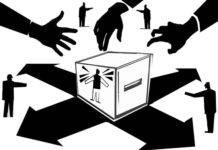The party should be banned not because of war crimes only, but also for deep flaws in its ideology

- Do war criminals have a place in politics?
Jamaat-e-Islami and its student wing, Chhatra Shibir, have once again come to the focus of attention due to strong demand from many quar-ters – national and international – for the imposition of a ban on their politics. However, Jamaat (which includes Shibir) thinks the ruling Awami League might not proceed to outlaw them. Rather, the AL would prefer to keep the party under pressure, as banning them would mean losing a vital part needed towards winning the national polls. The ruling party is really frightened over that issue.
Prime Minister Sheikh Hasina, after the January 5 elections, in a press conference confirmed that her government would not proscribe Jamaat as a terrorist organisation by applying executive power, since a case on the ban over the party was pending with the top court of Bangladesh.
The government, when it had lodged an appeal with the apex court seeking the death penalty for Ghulam Azam, the chief of Bangladesh chapter of Jamaat in 1971, also sought the ban on the party for its role in the Liberation War.
As a political party, the AL carries out the political calculation of benefits and losses on the ban issue. But we think the party should be banned not because of war crimes only, but also for deep flaws in its ideology. Jamaat says it is working towards establishing an “Islamic state.” However, it does not follow the teachings of the Qur’an, the scripture of Islam, which stands for peace and for upholding human rights.
In fact, they have a vision to establish a theocracy to suppress the people in many ways in the name of Islam. When this type of party climbs to power, first they execute their Muslim opponents who preach human well-being and the unmasking of zealots as the first and foremost duty, terming them as “Murtad” (a person who forsakes Islam).
After the International Crimes Tribunal’s first verdict which ordered the hanging of Abul Kalam Azad alias Bachchu Razakar, a former leader of Jamaat, in my capacity as a journalist I met a top Jamaat leader who was also a former chief of Shibir. At that time, I asked him where in Islam it was prescribed that execution was the punishment for an apostate.
At first, he said it could be found in the Qur’an. Then I affirmed that not a single verse of the Qur’an said such a thing. He then backtracked from his stance, but stuck to his point saying the Hadith said this. When these leaders are not sure about things, how could they run this country according to Islam?
Islam would teach us to protest against the oppression that was waged on us by the then West Pakistan regime. So, when a political party under the guise of Islam actively supports the oppressors, what word should be used to describe them? Though it is evident from the recent resolution of the Pakistan parliament that Jamaat actively supported them in 1971, the party has not yet apologised to the people of this country for their reprehensible stance.
The war crimes trial, which started in 2010, has played a substantive role in unmasking the character of Jamaat. The party has left no stone unturned – causing bloodshed while persuading the international community, including superpower USA, to mount pressure on Bangladesh in order to save Bangladeshi leaders from execution or conviction on charges of crimes against humanity, genocide, and other heinous crimes committed in the Liberation War of 1971. But they failed eventually.
The phone call from US secretary of state John Kerry did not succeed in saving Jamaat leader Abdul Quader Molla from the gallows, as the people of Bangladesh wanted the execution of all war criminals.
On February 28 last year, when the war crimes tribunal ruled for the execution of Delwar Hossain Sayedee, a rumour was widely circulated that the face of the Jamaat leader was seen on the moon. Asked about the issue, a Jamaat leader in Cox’s Bazaar said believing such things went against Islam, but was correct as a strategy.
This is the character of Jamaat men. In Jamaat-Shibir, there are many activists whose intentions are good, but they fall victim to brain-washing. We urge them to ponder over the message of the Qur’an, think freely, and scrutinise the party leaders and their ideology, which will lead them to leave the religious fanatics and work for the well-being of humanity.
We press for the banning of the politics of Jamaat-Shibir for the sake of humanity. If the government ensures sound education and helps people understand that the banning of militants is not something that will merely serve a political purpose, but the greater interest of the country, I think there is very little chance for Jamaat-Shibir to continue as a terrorist organisation. Power revolves around the people.
Source: Dhaka Tribune









